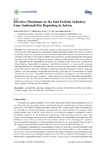Effective Disclosure in the Fast-Fashion Industry: from Sustainability Reporting to Action

Use this link to cite
http://hdl.handle.net/2183/20755Collections
- Investigación (FEE) [923]
Metadata
Show full item recordTitle
Effective Disclosure in the Fast-Fashion Industry: from Sustainability Reporting to ActionDate
2017Citation
Garcia-Torres, S., Rey-Garcia, M. & Albareda-Vivo, L. (2017). Effective Disclosure in the Fast-Fashion Industry: from Sustainability Reporting to Action. Sustainability, 9(12), 2256. doi.org/10.3390/su9122256
Abstract
[Abstract]: This work, set in the context of the apparel industry, proposes an action-oriented disclosure
tool to help solve the sustainability challenges of complex fast-fashion supply chains (SCs). In a search
for effective disclosure, it focusses on actions towards sustainability instead of the measurements and
indicators of its impacts. We applied qualitative and quantitative content analysis to the sustainability
reporting of the world’s two largest fast-fashion companies in three phases. First, we searched for
the challenges that the organisations report they are currently facing. Second, we introduced the
United Nations’ Sustainable Development Goals (SDGs) framework to overcome the voluntary
reporting drawback of ‘choosing what to disclose’, and revealed orphan issues. This broadened the
scope from internal corporate challenges to issues impacting the ecosystems in which companies
operate. Third, we analysed the reported sustainability actions and decomposed them into topics,
instruments, and actors. The results showed that fast-fashion reporting has a broadly developed
analysis base, but lacks action orientation. This has led us to propose the ‘Fast-Fashion Sustainability
Scorecard’ as a universal disclosure framework that shifts the focus from (i) reporting towards action;
(ii) financial performance towards sustainable value creation; and (iii) corporate boundaries towards
value creation for the broader SC ecosystem.
Keywords
Sustainability reporting
Sustainability actions
United Nations SDGs
Fast-fashion industry
Supply chain sustainability
Sustainability scorecard
Sustainability actions
United Nations SDGs
Fast-fashion industry
Supply chain sustainability
Sustainability scorecard
Rights
CC BY Atribución 4.0 España
Related items
Showing items related by title, author, creator and subject.
-
Turismo sostenible: revisión del concepto a través de los ODS y análisis de la estrategia española para la transición
Martínez Díaz, Óscar (2022)[Resumen]: Existe una creciente preocupación a nivel mundial en cuanto a la urgencia de avanzar en la aplicación efectiva de la transición sostenible en la economía. Dado que el sector turístico es uno de los más relevantes ... -
Development of a global SDG progress index aimed at “leaving no one behind”
Puertas, Jerónimo; Bermúdez, María (MDPI, 2020)[Abstract:] The United Nation’s Sustainable Development Goals (SDGs) constitute a set of shared global objectives for the development over the coming years, which both developed and developing countries are working together ... -
Turismo sostenible, un intento de adaptación al cambio climático
Freijeiro Iglesias, Patricia (2024)[Resumen] El cambio climático se ha convertido en un problema global provocando consecuencias que afectan a todos los sectores, en especial al sector turístico. Aunque ya es un tema que está en boca de todos, es necesario ...






